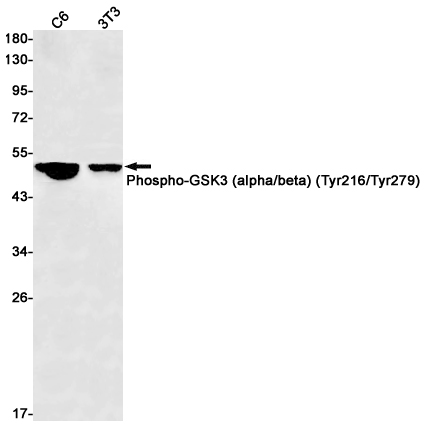-
Product Name
Anti-Phospho-GSK3 (alpha + beta)(Tyr216/Tyr279) Rabbit antibody
- Documents
-
Description
Phospho-GSK3 (alpha + beta)(Tyr216/Tyr279) Rabbit polyclonal antibody
-
Tested applications
WB, ICC/IF, IP
-
Species reactivity
Human, Mouse, Rat
-
Isotype
Rabbit IgG
-
Preparation
Antigen: A synthetic phosphopeptide corresponding to residues surrounding Tyr216 of human GSK3 alpha
-
Clonality
Polyclonal
-
Formulation
Supplied in 50nM Tris-Glycine(pH 7.4), 0.15M Nacl, 40%Glycerol, 0.01% sodium azide and 0.05% BSA.
-
Storage instructions
Store at -20°C. Stable for 12 months from date of receipt.
-
Applications
WB: 1/1000
ICC/IF: 1/50
IP: 1/20
-
Validations

Western blot detection of Phospho-GSK3 (alpha/beta) (Tyr216/Tyr279) in C6,3T3 cell lysates using Phospho-GSK3 (alpha/beta) (Tyr216/Tyr279) Rabbit pAb(1:1000 diluted).Predicted band size:51,47kDa.Observed band size:47-51kDa.
-
Background
Swiss-Prot Acc.P49840.Constitutively active protein kinase that acts as a negative regulator in the hormonal control of glucose homeostasis, Wnt signaling and regulation of transcription factors and microtubules, by phosphorylating and inactivating glycogen synthase (GYS1 or GYS2), CTNNB1/beta-catenin, APC and AXIN1. Requires primed phosphorylation of the majority of its substrates. Contributes to insulin regulation of glycogen synthesis by phosphorylating and inhibiting GYS1 activity and hence glycogen synthesis. Regulates glycogen metabolism in liver, but not in muscle. May also mediate the development of insulin resistance by regulating activation of transcription factors. In Wnt signaling, regulates the level and transcriptional activity of nuclear CTNNB1/beta-catenin. Facilitates amyloid precursor protein (APP) processing and the generation of APP-derived amyloid plaques found in Alzheimer disease. May be involved in the regulation of replication in pancreatic beta-cells. Is necessary for the establishment of neuronal polarity and axon outgrowth. Through phosphorylation of the anti-apoptotic protein MCL1, may control cell apoptosis in response to growth factors deprivation.
Related Products / Services
Please note: All products are "FOR RESEARCH USE ONLY AND ARE NOT INTENDED FOR DIAGNOSTIC OR THERAPEUTIC USE"
